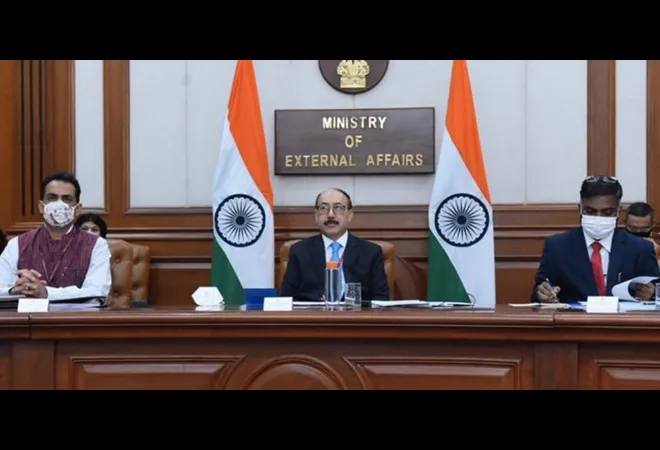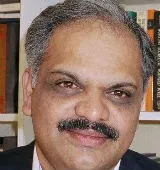
The recent debate between former Indian foreign service officials is a good illustration of how Indian officialdom thinks of foreign policy and what is wrong with it. What is being ‘debated’ has less to do with the principles of foreign policy than with domestic politics. On foreign policy itself, sadly, there is quite a bit of common ground between the two sides. Most fundamentally, both sides in the debate appear to accept that ideas matter more than material power. The endless debate about what kind of idea India should stand for masks the more fundamental question of whether we should focus on ideas or on externally-focused material capacity.
The endless debate about what kind of idea India should stand for masks the more fundamental question of whether we should focus on ideas or on externally-focused material capacity.
Both sides in the debate are pushing different versions of the ideas that they think should guide Indian foreign policy, taking for granted that ideas have some kind of autonomous role in foreign policy while ignoring material factors. To the extent that they refer to material power at all, it is only as a critique of the failure of their opponents to match material capacity with ideas. This is quickly abandoned, of course, when the discussion turns to other ideas— their own—that India should stand for. Thus, the criticism of the lack of material power to push the idea of India as a ‘Vishwa Guru’ is perfectly valid. Unfortunately, it is then something of a contradiction to push the idea that India is a different kind of power, and that India’s power is the ‘power of example’. On the other side, the defenders of the Modi government’s foreign policy are equally beholden to the belief that ideas matter more than material power. Why else would they promote India’s cultural soft power as if it is of any practical consequence in international politics?
Ideas do matter. Ideas by themselves rarely do. Ideas, important as they are, will not go anywhere unless these ideas have material power backing them. If India’s foreign policy experience should have taught us anything at all, it is that ideas cannot substitute for the lack of material power. The key question to debate is not what ideas matter but when ideas matter.
If India’s foreign policy experience should have taught us anything at all, it is that ideas cannot substitute for the lack of material power. The key question to debate is not what ideas matter but when ideas matter
The interplay between ideas and material power
Unfortunately, neither side in the debate reveal much understanding of the relationship of material power to ideas or norms. In international politics, ideas usually do not have much power on their own. It is not the most beautiful idea, or the most sensible one, or even the one that is supported by the most of world or the states of the world that matter. If this were so, the international community would have chosen to deal with the threat of nuclear weapons by abolishing them. This is what most of the world wanted (though, full disclosure, I do not think this was or is a good idea). But the great powers, all armed with nuclear weapons, decided a better way was to control the spread of these weapons. Not surprisingly, non-proliferation, not nuclear disarmament, was the norm that came to be. Non-proliferation was backed by the great powers while nuclear disarmament by those who did not have much material power. The result should not have been much of a surprise.
Equally at issue in this debate is the relationship between national power and domestic economic development. In other words, whether India should aim to be a great power at all. Is the game worth the candle? It is somewhat schizophrenic to be both seeking a UN Security Council seat, a long-standing Indian ambition pursued across multiple administrations, and decrying the pursuit of great power-ness. There is little doubt that very often Indian ambitions do not appear to be moored to any practical national requirements: The goals become ends in themselves. A country that has done little to push investigation of the COVID virus origins despite being the head of the WHO Executive Board does not inspire much confidence that it will do much with a permanent seat in the UNSC.
That said, it is unlikely that India will become a great power if it simply pays attention to domestic economic and social development. India, and every other state, lives in an international arena in which every state has to take care of itself. This means that the primary purpose of states is to ensure that they are safe from foreign threats. If a state fails at this first basic purpose, then it puts at risk not only its own security but also its own economic and social development. We don’t have to look far to find evidence of this: India in the 1950s will suffice. Nehru’s inattention to the threat posed by China led not only to the 1962 defeat but also had second order consequences for India’s economic development. It forced India to make massive investment in its security in the 1960s, a significant factor in derailing India’s economic development plans in the 1960s.
This does not mean, of course, that India should focus on its external environment to the detriment of its domestic needs. There are plenty of examples of such imbalance also. The Soviet Union collapsed because its leaders spent far more on competing with the US than their economic base could sustain. Closer home, Pakistan’s example is also useful: Foolishly trying to keep up with a much larger India has had all kinds of negative domestic effects on the country. These examples point to the need for balance, which is missing in simplistic claims that if India took care of itself domestically, its international condition would follow.
India has enjoyed the luxury of great relative security in the many decades since independence. That happy condition has changed. India does need a serious foreign policy debate about how to proceed. Unfortunately, this is not it.
What is also missing in such assertions is the relative aspect of domestic economic development. Doing well domestically cannot provide a favourable external condition if other countries, especially those like China with which India has security concerns, are doing even better. It would be nice if international competition were limited to comparing relative prosperity and well-being. Unfortunately, it is not. The relatively greater wealth quickly translates into power, and power into threats that one would be foolish to ignore. Moreover, people’s well-being does not always translate into national capacities. Just think of New Zealand, or even Australia, whose far better domestic condition does not make them immune to threats from China.
India has enjoyed the luxury of great relative security in the many decades since independence. That happy condition has changed. India does need a serious foreign policy debate about how to proceed. Unfortunately, this is not it.
The views expressed above belong to the author(s). ORF research and analyses now available on Telegram! Click here to access our curated content — blogs, longforms and interviews.




 PREV
PREV


